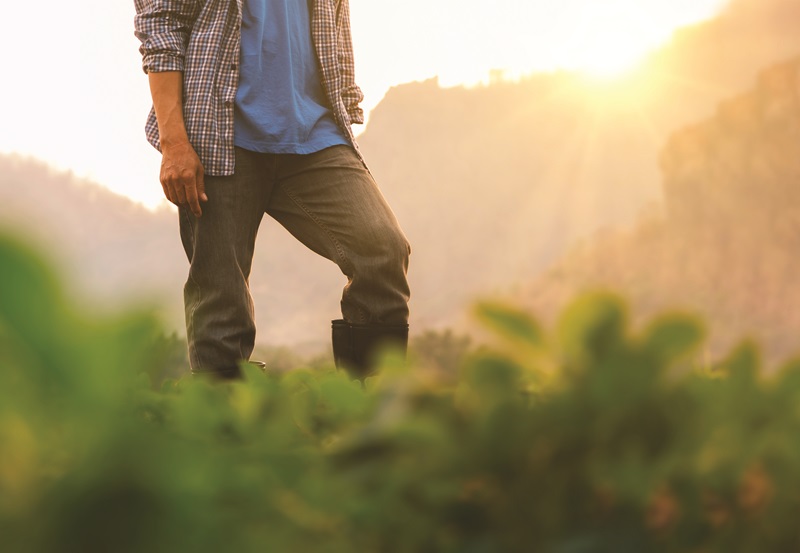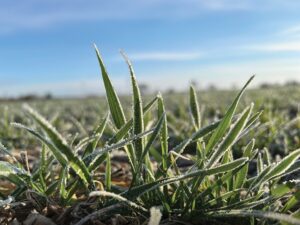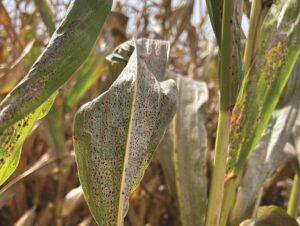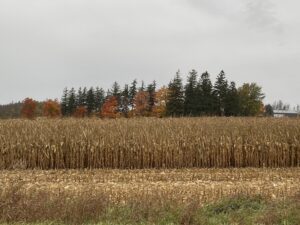Filling your wellness toolbox

THE BUSY HARVEST SEASON CAN LEAVE FARMERS FEELING LIKE THERE IS NOTHING LEFT IN THE TANK. But investing in your mental and physical health this winter can help you restore your equilibrium and be better prepared for the next planting season, which is just around the corner.
Bonnie Taylor, a registered social worker and psychotherapist in Kitchener, Ontario, suggests starting with a personal wellness check. “Take some time to think about how you are doing and how you know when you are not doing well,” she says.
Self-awareness is important, agrees Deborah Vanberkel, a registered psychotherapist who farms with her husband in eastern Ontario. Some of the signs to watch for include racing thoughts, lack of motivation, brain fog, struggling to make decisions, irritability, under- or over-eating, and increased substance use.
In particular, she recommends “paying attention to what’s changing, what’s out of the ordinary.” She notes that it’s often someone close to us who will see the shift first.
Taylor says this is also a good time for farmers to pause and reflect on what they have accomplished, to acknowledge how hard they worked and who was with them on their team.
MAKE A PLAN
Just as you plan for your crops, Vanberkel recommends having a plan for what helps you recover after the “go-go-go” of the harvest season. “What tools do you want in your toolbox? Is it a family activity? A vacation with your spouse?”
Taylor agrees. It can be useful to reflect on how you can fill your bucket, she says. “Take stock. Think about what’s missing. Are you wanting more social connection? Who didn’t you have time to connect with before? What hobbies did you put on the back burner? What sings to your soul? Are there inspirational books you want to read?” “It’s important to get exercise; otherwise, our bodies stiffen up,” continues Taylor, adding that there are many ways to be active, such as snowshoeing, using an exercise bike, curling, playing hockey, or doing yoga.
Lauren Van Ewyk, a registered social worker, psychotherapist, and sheep farmer from Courtright, Ontario, adds that there is a strong link between regular exercise and sleep quality. She says that building exercise into your daily routine, especially during the darker days of winter, can help improve sleep and release cortisol, the stress hormone. “Chronic stress can lead to high levels of cortisol in your body which impacts digestion, weight gain, pre-diabetes along with mental health concerns such as anxiety and depression … when we sleep, our body heals.”
Van Ewyk says gratitude is another powerful tool for the toolbox. “Each day, list five things that happened the day before that you are thankful for. Make them specific. By practicing daily, your brain learns to look for the bright spots in your day.”
She adds that many farmers would also benefit from practicing self-compassion. The reality is that many farmers are critical of themselves, holding themselves to impossibly high standards. While acknowledging that it can seem like a lofty ideal, she says we need to speak kindly to ourselves and remind ourselves that we are precious and deserve to be treated with care and concern.
SETTING GOALS
Winter is also a good time to set goals for yourself, your business or your family continues Van Ewyk. She explains that people who don’t have a vision for their lives often struggle with feeling like they aren’t reaching their full potential. After reflecting on what’s going well, what’s not going well, and what areas need some attention, she recommends developing goals with actionable steps. She suggests focusing on one of the five areas — health/wellness, financial, work/education, faith, and relationships — at a time.
Mental health is on a continuum, and although it’s not the whole picture, sometimes making small changes in your behaviour can make a difference, says Waterloo, Ontario registered social worker, Chad Bouma. “Going for a walk around the barn first thing in the morning could feel almost like a meditation. If you are going to be in the cab for 16 hours, do you have music that you enjoy? Or a podcast that you can listen to? Changes don’t have to be dramatic to affect some positive change.”
If you’ve been putting off looking after your physical health because you were too busy, you should make an appointment to see your doctor, continues Vanberkel, adding that physical and mental health are connected. “There could be a physical reason for your low energy and fatigue, for example.”
Vanberkel, who is also head of programming for the Canadian Centre for Agricultural Wellbeing, which conducts research to develop evidence-based programming, says farmers can learn more about mental health by checking out resources online or participating in a workshop to help them develop strategies that are going to work for them.
She notes that each person is unique, so solutions need to be specific. “It’s hard to give quick tips because it needs to be individualized. If you are having trouble sleeping, for example, what’s going on that’s causing the sleep disturbances?”
Sometimes, it can be hard to put what you are feeling into words, acknowledges Taylor. “Is it frustration? Restlessness? Is it hard to focus?” Talking to someone you trust can be helpful and if you are open to counselling, a counsellor can help you come up with coping strategies.
If farmers feel they are not coping well, it could be an indication it’s time to seek professional support, says Bouma. Fortunately, counsellors have become more accessible as many work virtually or by phone and more counsellors are receiving training in agricultural literacy so they can better support the farming community.
RESOURCES
Farm Credit Canada offers a Wellness Self- Check Tool www.fcc-fac.ca/en/documents/ wellness-assessment-tool.
Three Oaks Respite Cabin in Shetland, Ontario, is a place where farmers can rejuvenate and be intentional about their wellness strategies: www.threeoakscabin.com.
Grain Farmers of Ontario’s Farmer Wellness page: www.gfo.ca/farmerwellness.
In Ontario, the Farmer Wellness Initiative provides free, unlimited mental health counselling for the farming community. Go to www.farmerwellnessinitiative.ca for more info.
If you or someone you know is in crisis, call 911 or visit your local emergency room. •



























